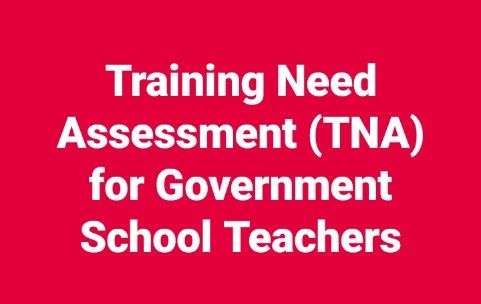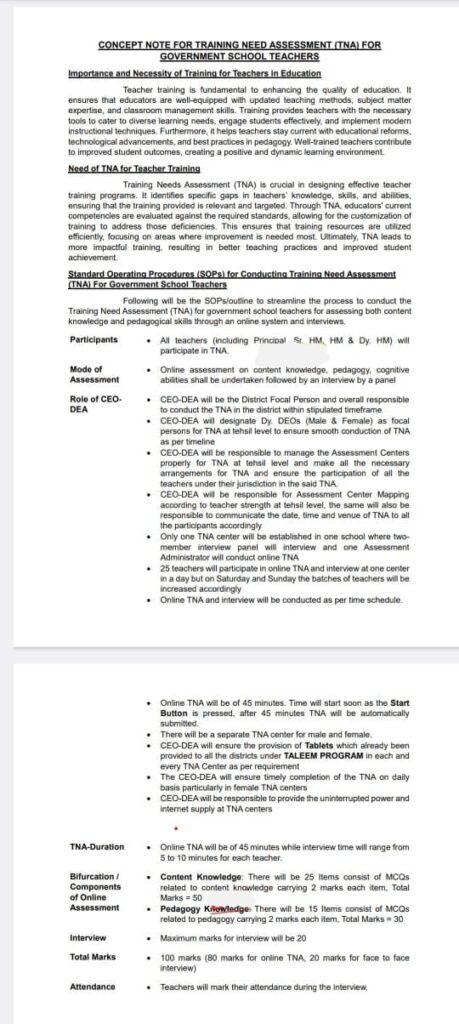Training Need Assessment (TNA) for Government School Teachers: A Comprehensive Guide
Contents
Training Need Assessment (TNA) for Government School Teachers: A Comprehensive Guide

Introduction
Training Need Assessment (TNA) is a crucial process in education to identify the specific gaps in teachers’ knowledge, skills, and abilities. This assessment helps ensure that teacher training programs are relevant, targeted, and effective. By understanding the needs of teachers, TNA enables the development of customized training programs that address specific deficiencies and enhance overall teaching quality.
Importance and Necessity of TNA for Teacher Training
- Ensures relevant and targeted training: TNA identifies specific gaps in teachers’ knowledge and skills, ensuring that training programs address the most pressing needs.
- Improves teaching quality: Well-trained teachers are better equipped to engage students, implement effective teaching methods, and create a positive learning environment.
- Enhances student outcomes: Effective teacher training leads to improved student achievement and overall educational success.
- Promotes professional development: TNA provides opportunities for teachers to develop their skills and stay updated with the latest educational trends and practices.
Standard Operating Procedures (SOPs) for Conducting TNA
Participants:
- All teachers, including principals, headmasters, deputy headmasters, and subject teachers, will participate in the TNA.
Mode of Assessment:
- Online assessment: Teachers will take an online assessment to assess their content knowledge, pedagogy, and cognitive abilities.
- Interview: A panel of experts will conduct interviews with teachers to assess their practical skills and teaching methodologies.
Role of CEO-DEA:
- The CEO-DEA will be the district focal person responsible for overseeing the TNA process.
- The CEO-DEA will designate deputy DEOs as focal persons at the tehsil level to ensure smooth implementation of the TNA.
- The CEO-DEA will manage the assessment centers and make necessary arrangements for TNA.
- The CEO-DEA will ensure the participation of all teachers under their jurisdiction.
- The CEO-DEA will conduct assessment center mapping and communicate the date, time, and venue of TNA to all participants.
- Only one TNA center will be established in one school, with a two-member interview panel and one assessment administrator.
- The CEO-DEA will ensure the provision of tablets and uninterrupted power and internet supply at TNA centers.
TNA Duration:
- The online TNA will be 45 minutes, while the interview will range from 5 to 10 minutes per teacher.
Bifurcation/Components of Online Assessment:
- Content Knowledge: 25 MCQs related to content knowledge, each carrying 2 marks.
- Pedagogy Knowledge: 15 MCQs related to pedagogy, each carrying 2 marks.
Interview:
- Maximum marks for the interview will be 20.
Total Marks:
- 100 marks (80 marks for online TNA, 20 marks for face-to-face interview).
Attendance:
- Teachers will mark their attendance during the interview.
FAQs
- What is the purpose of TNA?
- TNA identifies the specific gaps in teachers’ knowledge, skills, and abilities to ensure that teacher training programs are relevant and targeted.
- Who will participate in the TNA?
- All teachers, including principals, headmasters, deputy headmasters, and subject teachers, will participate.
- How will the TNA be conducted?
- The TNA will be conducted through an online assessment and interviews.
- What are the components of the online assessment?
- The online assessment will assess content knowledge and pedagogy.
- How will the interviews be conducted?
- Interviews will be conducted by a panel of experts to assess teachers’ practical skills and teaching methodologies.
Conclusion
Training Need Assessment is a vital tool for improving the quality of education. By identifying the specific needs of teachers and providing targeted training, TNA can help enhance teaching practices, improve student outcomes, and promote professional development. The SOPs outlined in this article provide a framework for conducting effective TNAs in government schools. By implementing these procedures, educational institutions can ensure that their teacher training programs are aligned with the needs of their educators and contribute to the overall success of the education system.








